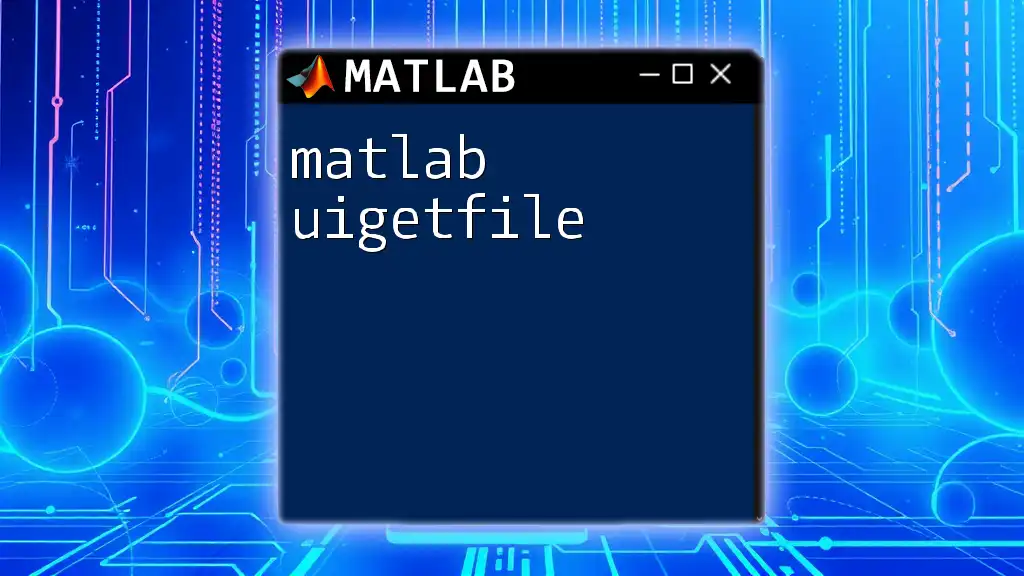The `fgetl` function in MATLAB reads a line of text from a file, returning it as a string while advancing the file position indicator to the next line.
fid = fopen('example.txt', 'r'); % Open the file for reading
line = fgetl(fid); % Read the first line from the file
fclose(fid); % Close the file
Understanding fgetl
What Does fgetl Do?
The function `fgetl` in MATLAB plays a crucial role in file input/output (I/O). It is specifically designed to read text files line by line, making it a fundamental tool for handling text data. When you utilize `fgetl`, it retrieves the next line from the opened file without including the newline character. This characteristic distinguishes it from other functions, such as `fgets`, which does include the newline character. Understanding these differences is essential for selecting the right function based on your specific needs when working with text data.
Syntax of fgetl
The syntax for using the `fgetl` function is straightforward:
line = fgetl(fileID);
- `fileID`: This is the identifier that corresponds to the file you have opened using `fopen`. It allows MATLAB to know which file to read from.
- `line`: This variable captures the output, which is a string containing the text of the line that was just read from the file. If the end of the file is reached, `fgetl` returns `-1`, allowing for error checking.

Getting Started with fgetl
Opening a File for Reading
Before you can read from a file with `fgetl`, you must first open the file using `fopen`, specifying the mode as read (`'r'`). Opening a file correctly is crucial, as failure to do so can lead to errors in subsequent operations.
fileID = fopen('myfile.txt', 'r');
To ensure that the file opened successfully, you should implement a check:
if fileID == -1
error('File could not be opened.');
end
Reading Lines with fgetl
Once the file is open, you can begin to read it using `fgetl`. Here’s how you can read the first line from the file:
line = fgetl(fileID);
disp(line); % Displays the current line
To read through the entire file line by line until you reach the end, you can use a loop:
while ischar(line)
disp(line); % Display the current line
line = fgetl(fileID); % Read the next line
end
This procedure allows you to process each line of the file in sequence.

Error Handling
Managing File Read Errors
When dealing with files, errors can occur, making error handling essential in your programming. Common issues when using `fgetl` include reaching the end of the file unexpectedly or encountering read errors. Here’s how to manage these potential issues:
if ~ischar(line)
disp('End of file reached or read error occurred.');
end
This check ensures that you prompt the user with informative messages if something goes wrong.
Closing the File
After reading from a file, it's important to close it to free up system resources and prevent potential errors in future operations. You can close the file using the `fclose` function:
fclose(fileID);
Here’s a complete routine that demonstrates how to read a file and ensure proper closure:
fileID = fopen('myfile.txt', 'r');
if fileID == -1
error('File could not be opened.');
end
line = fgetl(fileID);
while ischar(line)
disp(line);
line = fgetl(fileID);
end
fclose(fileID);

Advanced Usage of fgetl
Reading Specific Lines
If you need to read specific lines from a file, you can incorporate a counter that tracks the line number:
lineNumber = 1;
while ischar(line)
if lineNumber == desiredLine % e.g., desiredLine = 3
disp(line); % Display the specific line
end
line = fgetl(fileID);
lineNumber = lineNumber + 1;
end
This approach allows for selective processing based on your needs, enhancing your data handling capabilities.
Using fgetl with Cell Arrays
A common practice in data processing involves storing the lines read from the file in a cell array for further use. By appending each line to the cell array, you can easily manage and manipulate the data later on:
lines = {};
while ischar(line)
lines{end+1} = line; % Append current line
line = fgetl(fileID);
end

Practical Applications of fgetl
Real-World Use Cases
The `fgetl` function is invaluable in various real-world scenarios. Common applications include importing data for analysis or processing logs and configuration files.
For instance, when working with a CSV file structured as a text file, you can utilize `fgetl` to read each line, parse the data into usable formats, and perform calculations or analysis with ease. This functionality makes it a versatile tool in any MATLAB programmer's toolkit.

Conclusion
In summary, the `matlab fgetl` function is an efficient way to read text files in MATLAB. By understanding its syntax, implementing error handling, and utilizing advanced functions, you can effectively manipulate text data for your specific needs. Mastering `fgetl` empowers you to streamline data processing tasks, making it a must-know function for beginners and advanced MATLAB users alike.

Additional Resources
For further study, refer to the official MATLAB documentation on `fgetl` and other file I/O functions. Check out community forums and tutorials for additional practice and tips to enhance your proficiency in file handling with MATLAB.

















